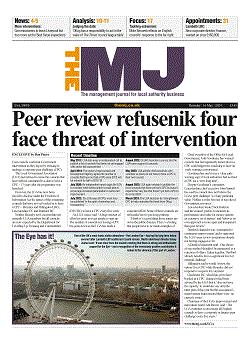The post-2015 Conservative governments’ focus on devolution followed the path set by previous Labour Governments, which George Osborne’s Northern Powerhouse initiative of 2014 promulgated: devolution not to existing local government but to new and much larger structures - Combined Authorities.
Whilst not compensating for the drastic cutbacks in local government funding over the past nine years, this initiative has resulted in some devolution of decision making - with funding attached - to many of England’s city regions, in respect of key functions such as economic development, transportation and infrastructure. There are now 11 combined authorities (CAs) in England. All are led, or will be led, by elected mayors. The three newcomers – East Midlands, York and North Yorkshire and the North East (which is an amalgamation of two precious CAs, north and south of the Tyne) will hold mayoral elections on 2 May as will the eight established CAs. Further CAs will be formed for Greater Lincolnshire and Hull and East Yorkshire, with proposals under discussion in Leicestershire and South Hampshire.
CAs clearly constitutes a growth industry and on balance are to be welcomed as they are the only real game in town for devolution. The earlier examples in Greater Manchester, Merseyside, West Midlands and West and South Yorkshire are all re-creations of the former metropolitan county councils, which operated from 1974 until 1986, when they were abolished as a result of the ‘streamlining the cities’ white paper (a title which reflects the current desire of the centre to steamline (reduce) local government).
The complex set of joint arrangements, established in 1986 to run the vast majority of county-wide functions meant metropolitan county government never really went away. The CAs created cover similar city region or conurbation territory (with the possible exception of Peterborough/Cambridgeshire). They are an extension of the met county principle, although they would not necessarily be seen as such by DLUHC. But, there has long been a strong case for a local government presence at this level to deal with the complexities of governance and democratic oversight of services.
There is a glaring inconsistency in the spread of CAs with another key feature of the DLUHC agenda – the creation of large unitary authorities in county areas previously operating a two-tier system (e.g. Shropshire, Somerset, Northamptonshire) because in all the 11 CAs, two-tier local government has been recreated. Liverpool, Manchester, Leeds and Birmingham are no longer unitary authorities; neither are Northumberland, North Yorkshire, nor, in due course Hull and East Riding. They will operate within CAs headed by an elected mayor. The election and the direct accountability of the mayor means CAs must be regarded as local authorities in their own right, unlike their non-mayoral predecessors, which were glorified joint boards. Two-tier local government has returned to large areas of England previously dominated by unitary authorities and that coverage will fall further as more CAs are established.
Indeed, in the Cambridgeshire/Peterborough and East Midlands CAs, there are three tiers of local government – the CA, the counties and the districts (and in some areas four where parishes and town councils operate). Personally, we feel quite relaxed about this outcome; throughout the rest of Europe and the USA, two - or three - tiered local government is commonplace, reflecting the important principle of subsidiarity. Indeed, unitary authorities are rare, and where they do exist they are smaller in population than our unitary councils. Moreover, the centre’s obsession with large unitary authorities has resulted in the average population size of our local authorities being over ten times larger than the European average.
One wonders what kind of discussions are taking place within DLUHC about the impact of the spread of CAs on its long - term programme of ‘unitarisation’. No doubt it will continue to seek opportunities to dismantle the two-tier system when an opportunity arises: Cambridgeshire, Worcestershire and Warwickshire, look particularly vulnerable. But in doing so, they would not, in most cases, be increasing the number of unitary authorities. The presence of CAs would preclude this outcome. Our hope is that in addressing this inconsistency, the nightmare scenario of an across-the-board system of large unitary authorities can be avoided and some form of a ‘local’ element in local government preserved.
Colin Copus is emeritus professor of local politics at De Montfort University and visiting professor at Ghent University and Steve Leach is emeritus professor of local government, De Montfort University

